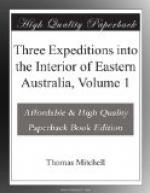I therefore set out with three men for the highest summit (bearing 124 degrees from North) and distant thirteen miles. We passed over four miles of firm open ground, with some small rough gumtrees upon it. We then crossed a track on which I saw the angophora for the first time since we traversed Dunlop’s range; and near it we passed a hollow about half a mile wide and a mile and a half long; in which, although the surface was of clay, there was no appearance of water ever having lodged, a circumstance for which we could only account by supposing that much rain seldom falls, at any season, in this part of the interior. We next entered a scrub of dwarf casuarinae, and Myoporum montanum (R. Br.) the latter bush prevailing so as to form a thick scrub at the foot of the hills, and even upon them.
RIDE TO GREENOUGH’S GROUP. VIEW FROM THE SUMMIT.
The range, like all those which I had examined near the Darling, was of exactly the same kind of rock as D’Urban’s group, Dunlop’s range, etc. etc., namely quartz rock breaking naturally into irregular polyhedrons, but at the base I noticed ferruginous sandstone. The summit afforded a very extensive view of the country to the eastward, which rose towards a range extending south-east and north-west, its two extremities bearing 103 and 122 degrees from north. At the foot of which a blue mist might be supposed to promise a river or chain of ponds in an ordinary season; and a rather high and isolated range of yellow rock, in the direction of Oxley’s Mount Granard, seemed to overlook some extensive piece of water or spacious plain to the south of it. An intervening valley appeared also to form a basin falling southwards, but immediately beyond the group I was upon a vast extent of country, not low, but without any prominent features, although chequered with plain and bush, stretched far to the eastward. There were no large trees visible on any side, but a thick scrub of bushes covered much of the country. Upon the whole I considered that in a wet season we might have travelled straight home, as there were many dry waterholes in the surface where it consisted of clay, but that, unless rain fell, it would be wiser, considering the exhausted state of our cattle, to keep to the beaten track, for the animals travelled much better upon it, and going back or homewards along that track, was more convenient in various respects than to travel where there was no road at all. As it now became necessary to distinguish the different ranges on my map I attached to this remarkable cluster of hills the name of Mr. Greenough, a gentleman who has done so much in uniting geology with geography, to the great advantage of both.
BARTER WITH NATIVES BEYOND THE DARLING.
On returning to the camp I found that two natives had been in communication with our party on the river during my absence; and that overseer Burnett had made a good brargain, having obtained from one of them a very well made net in exchange for a clasp knife, with which the native seemed much pleased. These visitors were young men, carrying each a net, and seemed to belong to the other side of the river.




